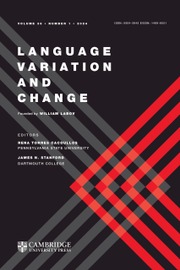Article contents
Stereotypes, variation and change: Understanding the change ofcoronal sonorants in a rural variety of Modern Greek
Published online by Cambridge University Press: 05 November 2008
Abstract
The results of a study of the variation between the palatal and alveolarpronunciation of the coronal sonorants /l/ and /n/ in a rural Greek communityare presented. The study integrates the methodologies of both large surveys andethnographic studies and shows that there is change in progress as youngerspeakers adopt the alveolar pronunciation through contact with urban varieties.The results of the statistical analysis indicate that the variation isdetermined by factors such as gender, education, attitude toward the localcommunity, and awareness of the variation. The responses given in the interviewsreveal that the palatal pronunciation is stigmatized as vlachika, a term that connotes rural rather than urban,uneducated rather than educated, and naive rather than sophisticated attributes.This information coupled with a closer look at the behavior of particularindividuals helps elucidate aspects of the pattern of variation that at firstappear to be counterintuitive.
Information
- Type
- Research Article
- Information
- Copyright
- Copyright © Cambridge University Press 2008
References
REFERENCES
- 2
- Cited by

